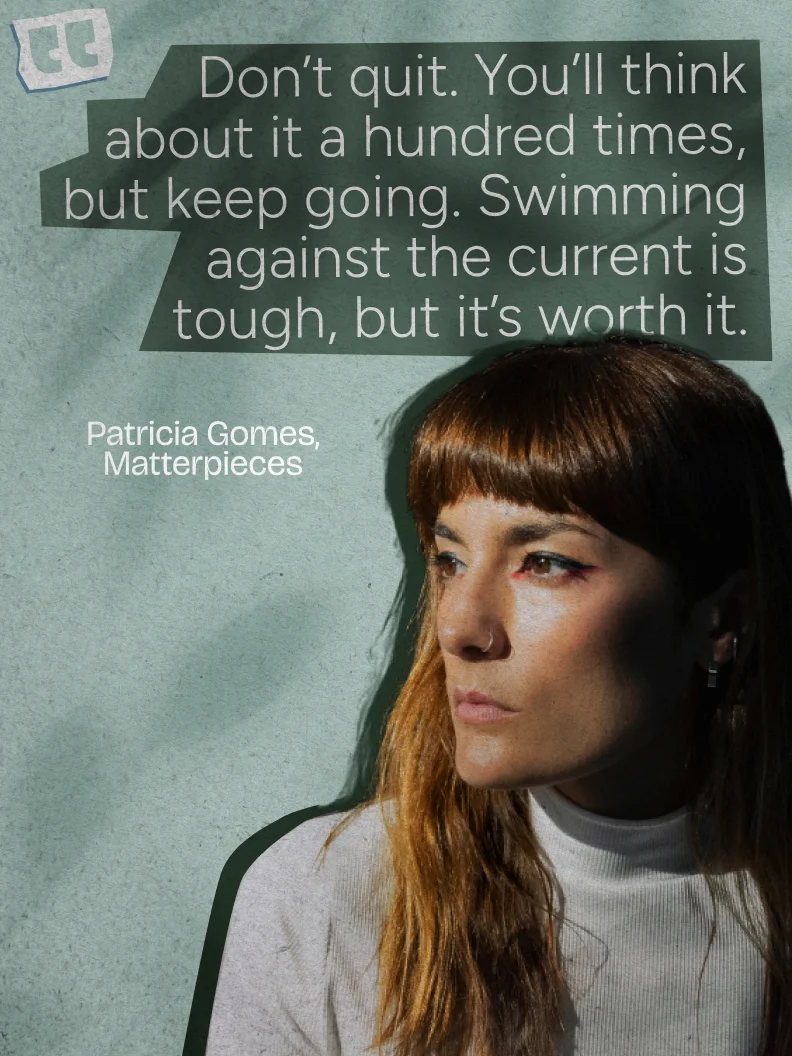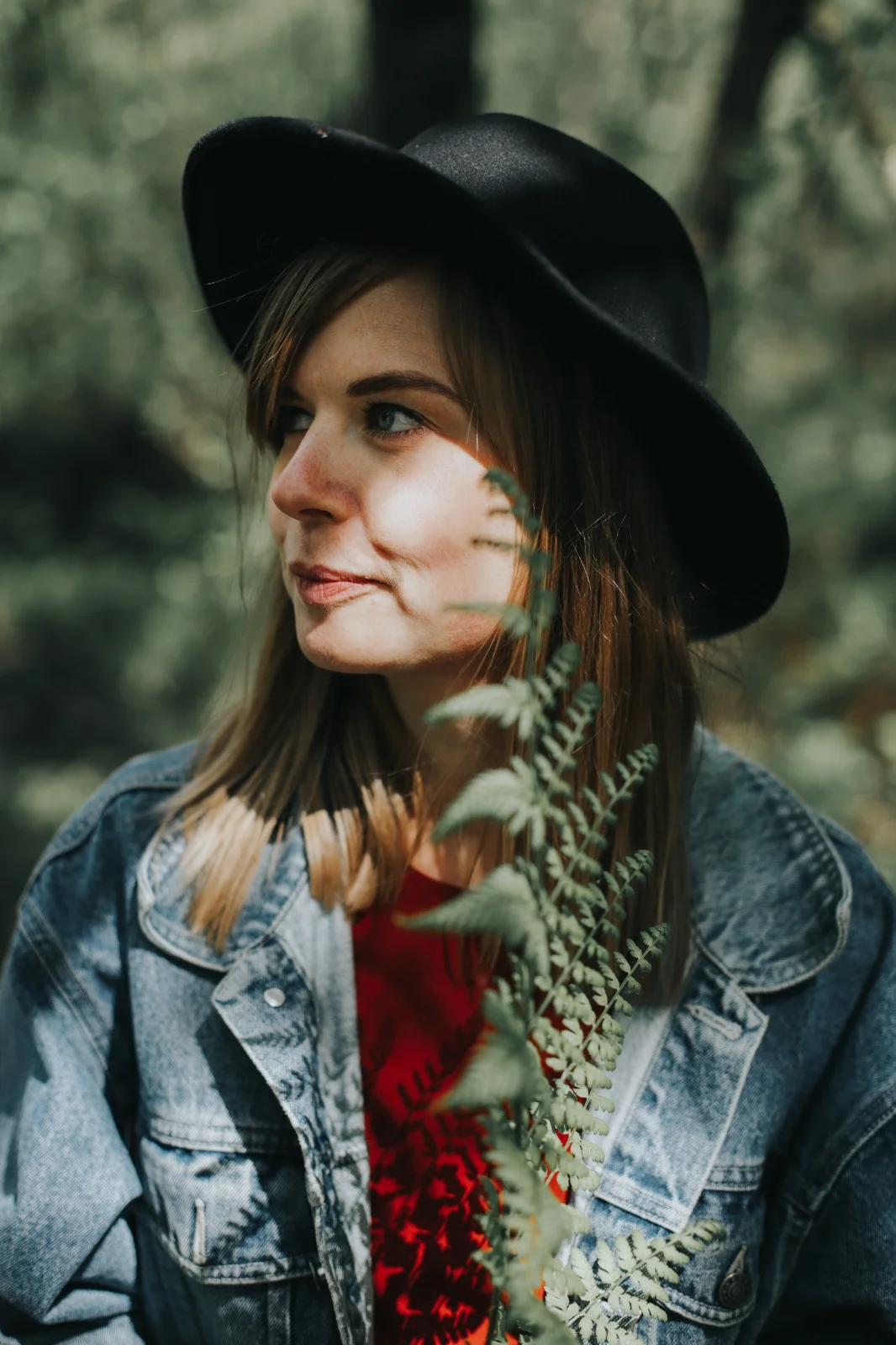
The construction industry is massive. And boy, is it resource-hungry. For decades, it’s been stuck in the same wasteful cycle - build, demolish, discard - leaving behind mountains of debris and a hefty carbon footprint. In fact, the construction industry is responsible for a jaw-dropping 38% of global CO2 emissions. But what if waste from demolished buildings could be transformed into high-end, beautiful materials? That’s exactly what Matterpieces is doing. More than a brand, Matterpieces is a movement redefining what’s possible in one of the world’s most rigid industries, proving that waste isn’t the end of the story, but the start of something better.
We sat down with Patricia Gomes, one of the masterminds behind Matterpieces, to talk about making sustainability the norm, designing with waste, and what it takes to go against the grain in an industry built on "business as usual."
Born and raised in Portugal with a head full of ideas and a heart set on making a difference. After graduating in architecture, Patrícia co-founded Prosaico - a collective blending social design with community magic in the streets of Porto. In 2014, she swapped pastéis de nata for schnitzels and spent six years in Vienna working on co-housing, public space, and ways to design with people, not just for them. When COVID hit, she landed back in Porto - no house, no plans, but with a massive passion for sustainable design.
Enter: Matterpieces. Born in her parents’ garage (as all good revolutions are), it started as a love letter to construction waste and grew into a full-blown industrial-scale movement to make building better - and circular. In 2023, she made the move to Lisbon, bringing Matterpieces to new heights and even more impact.
2012 – Co-founded Prosaico in Porto: because public space is for everyone, and good design can be a tool for justice.
2013–2019 – Teamed up with feld72 in Vienna to dream up co-housing, social housing, and new ways to interact with the city.
2020 – Co-founded studio8 in Porto: a transdisciplinary playground for architecture, design, and construction waste.
2022 – Launched Matterpieces, an impact-driven brand on a mission to turn waste into wonder
‘We - meaning me and co-founder, Luís Lima - were living in Vienna, working as architects on social housing projects, among others. We were already deeply aware of the industry’s impact and passionate about reshaping construction for the better. Then came a project to design a vegan restaurant. The client was all about sustainability, constantly pushing us to find the most eco-friendly solutions and materials for renovating the space.
During demolition, we watched walls come down, piles of waste forming - and at the same time, we were searching for sustainable materials. It felt like a complete contradiction: we needed materials, yet we were surrounded by them. But back then, we didn’t have a strategy to reuse them.
That moment planted a seed. Shortly after, just before the pandemic, we moved back to Portugal, where we were both born. Suddenly, in between houses, jobs, and lockdowns, we had time to experiment. Could we make waste beautiful and turn debris into something desirable?
We started making samples of new building materials - in garages, in our parents’ gardens, and alongside friends in material engineering. It was really hardcore, doing everything manually, but the results were amazing. One of our first breakthroughs was repurposing cement, old ceramic and roof tiles into sleek, terrazzo-like surfaces. But then came the big question: How do we scale this up from the kilos we were now doing by hand to the tons required when constructing or renovating buildings? We needed to up our game: talk with the demolition and waste management companies.

It wasn’t easy at all. At first, smaller companies thought we were crazy. Two architects, no factory, no waste management experience. We realized we needed to talk to the big players - the ones already upcycling parts of their waste for profit. The game-changer? Certification.
In Portugal, only a handful of companies have the magic stamp of approval to certify waste as building material - meaning we had to wait (im)patiently for them to give us the green light to start re-using it. Next to that we also needed a manufacturer to turn all that waste into something beautiful. We partnered with two big demolition and waste management companies, Costa Almeida Ambiente and Zircom, and manufacturer RMC. Together with them, we created an upcycling system. Thanks to these partners, we can sort and certify waste, which we then turn into Matterpieces.
For me, it’s never been just about recycling - it’s about impact. With Matterpieces, we don’t just want to make new materials; we want to push the entire industry forward. That came naturally, I guess. During our studies, we already took part in collectives where we thought about new community structures that would benefit our society and the way we live together as a whole. With Matterpieces, we want to spread optimism, show people we actually can make a difference and that there are new ways of building and co-creating that contribute to a better environment for us all.
That means we have to be transparent - showing what we recycle, how we do it, and what happens next. Sharing our knowledge, using our time and energy to connect people, we ensure that the whole is more than the sum of its parts. And it also means creating awareness, bringing people together, and influencing policies.
The industry we work in is hardcore. It values budget control, it’s fast, and it doesn’t like change. Sorting waste materials is expensive, and smaller companies hesitate. But things are shifting. Demolition companies are starting to see their materials as valuable rather than just waste to get rid of. Still, we need better regulations and incentives to drive change.
For now, we only produce claddings, like tiles and countertops. In the future, we would love to produce more structural elements like bricks as well, but working with different materials is challenging. Right now, we’re working with bricks, stone, cement, rooftiles, and glass. Ceramics are tricky to cut into slabs after we’ve processed them since they break easily, so we’re searching for a new approach.
We’re also exploring ways to upcycle plastics from car interiors. Every new material is a challenge, but also an opportunity. One of our recent projects involved turning reclaimed bricks into modular wall claddings for an urban renovation project.

It’s tricky, haha. I love buying things, but I try to buy everything second-hand. I’ve also cut down on plastic and waste at home. When I lived in Vienna, biking was easy, but Lisbon is tougher with all her hills. Still, I avoid using a car whenever possible. Sometimes it’s the little things that add up to bigger goals.
We’ve only launched Matterpieces recently, so scaling up is high on our priority list. We would love to find more material solutions and partner with ‘material banks’ to focus not just on recycling but also on reuse. Expanding beyond Portugal is also on our roadmap.
Most importantly, we want to gather more people in the industry to push this movement forward. We look up to companies like StoneCycling, who turn old bricks into new bricks, and Precious Plastic, who make recycling super creative. Also, architects like Lacaton & Vassal, who respect existing structures instead of demolishing them. It’s really about rethinking what already exists.
Another crucial step is creating community. We want to engage with local communities, architects, and policymakers to promote and implement more circular construction practices. By connecting the right players with the right projects, we can create real change in how we build, live, and think about waste.

First of all - don’t quit. You’ll think about it a hundred times - we surely did, but keep going. You’re swimming against the current, and it’s tough, but it’s worth it. Second - network. Talk to people, go to events, find like-minded companies. Once you start seeing change, it’s mind-blowing. And that’s what keeps you going.
Matterpieces isn’t just about materials - it’s about reimagining an entire industry. And if I have anything to say about it, circularity isn’t the future. It’s happening now.
Florine started out as an art critic, but that turned out to not be quite her thing. So, she did what any sensible person would do - packed her life (and family) into a tiny campervan and roamed the planet for seven years. Now back in the Netherlands, she’s juggling life as a strategic advisor for a Dutch non-profit, while also writing for magazines and platforms. When she’s not typing away, you’ll probably find her treasure-hunting at thrift stores to jazz up her tiny house by the sea. Or wandering outdoors, because apparently sitting still isn’t really her vibe.

Subscribe to the monthly mindshift
Our very best, every month in your mailbox. Subscribe now and join the reloved revolution!